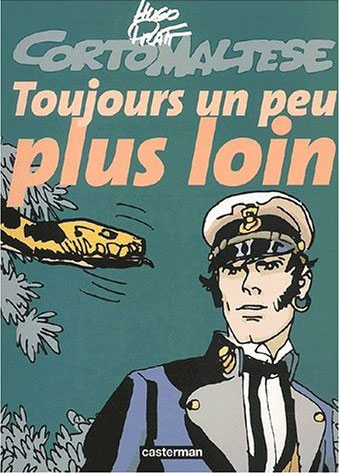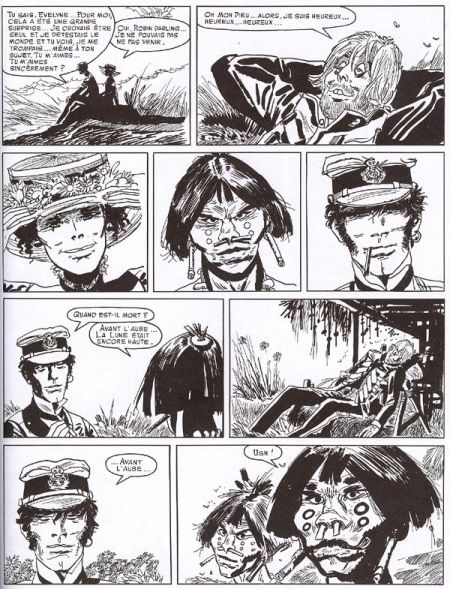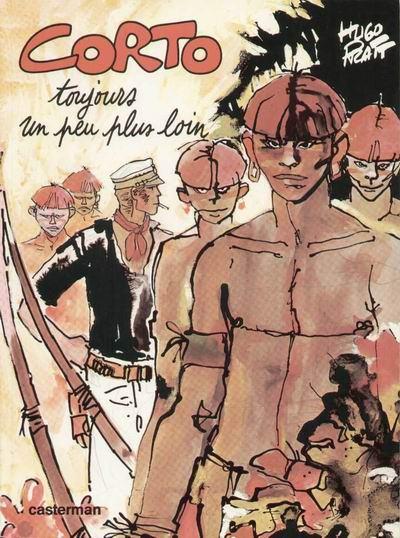Corto Maltese : Toujours un peu plus loin
By Hervé St-Louis
May 24, 2009 - 23:45
Casterman
Writer(s): Hugo Pratt
Penciller(s): Hugo Pratt
Inker(s): Hugo Pratt
Cover Artist(s): Hugo Pratt
ISBN: 978-2203332331
$27.99 CAN
This reviewer has not read a new Corto Maltese story in over a decade. I have many books in my collection so when I bought this one during my last trip to Montreal, I wasn’t even sure if I had this compilation of stories originally published between 1970 and 1971. There are five stories in this volume about adventures by the famous sailor sired by a British officer to a Gypsy prostitute. These stories are set in between 1913-1915 and follow Corto Maltese's adventures in the Caribbean sea and Central America, after the events that transpired in the previous collected edition Sous le signe du Capricorne (Under the Capricorn). The main challenge for English collectors of Corto Maltese is that many editions of his adventures exist. So far, no publisher has taken upon itself to translate and publish in chronological order all the stories of Corto Maltese in a way that would make sense for English readers. There are too many collections around with different names. The easiest would be to follow the chronology and order established by Belgian publisher Casterman. Their order is sound and they always have piles of Corto Maltese material available for gullible collectors like this reviewer. So if you don’t mind the French, the best way to collect Corto Maltese is to get the French editions of author Hugo Pratt. They will be easier to locate than Spanish or Italian versions and easily obtainable from Canadian stores.
 |
Pratt’s signature staging is in full effect in this story. Shoulder shots of characters, often facing each other, alternated with face shots where they look pass at each other. He mixes a few action shots of Corto maltese jumping, ducking bullets throwing suitcases at his opponents. One thing about Pratt’s work is that his characters rarely touch each other. They are all standing off next to one another. They have no emotion and its every man and woman for himself. Such is the world of the adventurer where no one is to be trusted. An enemy one day is a friend the next.
Of course, this is still early Pratt illustrations, so the characters are fully formed and not yet symbols of each other. The artist has not become lazy, relying only on his huge speech bubble to carry the story forward. The backgrounds, although only in black and white are textured and offer stark contrasts of light and dark. The Milton Caniff influence is still there, but the chaos in the artist’s work has already taken over and readers are treated to unpolished lines that suggest lots of movements and gesture, but contained in characters’ whose emotions are barely noticeable. Pratt may not be an artist that everyone can appreciate. I would argue that his staging is often wrong, cutting characters’ bodies at the neck throughout a story limits the information transmitted to readers. The visual storytelling is completely overshadowed by the large speech bubbles that could have been optimized and shortened. But this is how Pratt is and what made him so popular in the first place. His work is imperfect and fools like me find delight in that.
 |
The stories are short – about twenty pages each. They show what could be done in 22-page comic book a generation ago. They are as epic as the 180 pages it takes to tell a similar story nowadays on both sides of the Atlantic. It’s pure storytelling and the reader will not feel cheated. One thing about Pratt and this is found throughout in this story, is that all characters are equal. There’s no one that’s more of an idiot. They all have the same level of understanding. No one is naive. So when they approach Corto Maltese, they have a tendency to share the same voices. Only their respective roles differentiate them. Sometimes they are whores, scientists, soldiers, indigenous, rich heiress. It doesn’t matter. Yet the stories are fun and adventures for adults that would be rendered moot if animated or made for film. Surely the sulky allure that Pratt adds to the background, that mysticism and maturity would not make it to the screen.
 |
| Cover before 2001 edition |
This collection includes simple Corto Maltese stories that will serve as a good introduction to anyone that has never read about him. There’s always something exotic about the local and people met. There isn’t a grandiose epic like the Ballad of the Salted Sea, but it’s still a worthwhile compilation. Since it would seem that I had not read this book after all, it was a perfect reminder of why I’ve been a fan of Corto Maltese for so long.
Rating: 10/10
Related Articles:
Queer Voices in Hugo Pratt’s Corto Maltese
Milton Caniff’s Sons – Alex Toth and Hugo Pratt
